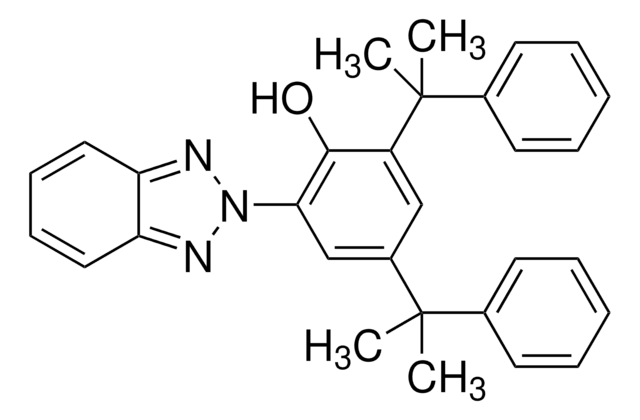About This Item
Recommended Products
loss
0.7 wt. % volatility, 150-175°C
mp
82-85 °C (lit.)
transition temp
Tg >350 °C (dec)
solubility
acetone: 19 % (w/w) at 20 °C
ethyl acetate: 24 % (w/w) at 20 °C
methanol: 38 % (w/w) at 20 °C
chloroform: 45 % (w/w) at 20 °C
methylene chloride: 56 % (w/w) at 20 °C
H2O: insoluble <6 ppm at 20 °C
SMILES string
CC1(C)CC(CC(C)(C)N1)OC(=O)CCCCCCCCC(=O)OC2CC(C)(C)NC(C)(C)C2
InChI
1S/C28H52N2O4/c1-25(2)17-21(18-26(3,4)29-25)33-23(31)15-13-11-9-10-12-14-16-24(32)34-22-19-27(5,6)30-28(7,8)20-22/h21-22,29-30H,9-20H2,1-8H3
InChI key
XITRBUPOXXBIJN-UHFFFAOYSA-N
Looking for similar products? Visit Product Comparison Guide
General description
Application
Signal Word
Danger
Hazard Statements
Precautionary Statements
Hazard Classifications
Aquatic Acute 1 - Aquatic Chronic 2 - Eye Dam. 1
Storage Class Code
11 - Combustible Solids
WGK
WGK 3
Flash Point(F)
>302.0 °F
Flash Point(C)
> 150 °C
Personal Protective Equipment
Certificates of Analysis (COA)
Search for Certificates of Analysis (COA) by entering the products Lot/Batch Number. Lot and Batch Numbers can be found on a product’s label following the words ‘Lot’ or ‘Batch’.
Already Own This Product?
Find documentation for the products that you have recently purchased in the Document Library.
Customers Also Viewed
Our team of scientists has experience in all areas of research including Life Science, Material Science, Chemical Synthesis, Chromatography, Analytical and many others.
Contact Technical Service![Poly[[6-[(1,1,3,3-tetramethylbutyl)amino]-s-triazine-2,4-diyl]-[(2,2,6,6-tetramethyl-4-piperidyl)imino]-hexamethylene-[(2,2,6,6-tetramethyl-4-piperidyl)imino] average Mn ~2,000](/deepweb/assets/sigmaaldrich/product/structures/679/088/c718a900-edcf-4dfa-ac1e-c410f3f12ab5/640/c718a900-edcf-4dfa-ac1e-c410f3f12ab5.png)










